Earlier this year the state promised to get tougher on wildlife poachers. In Harney County that promise just got put to the test
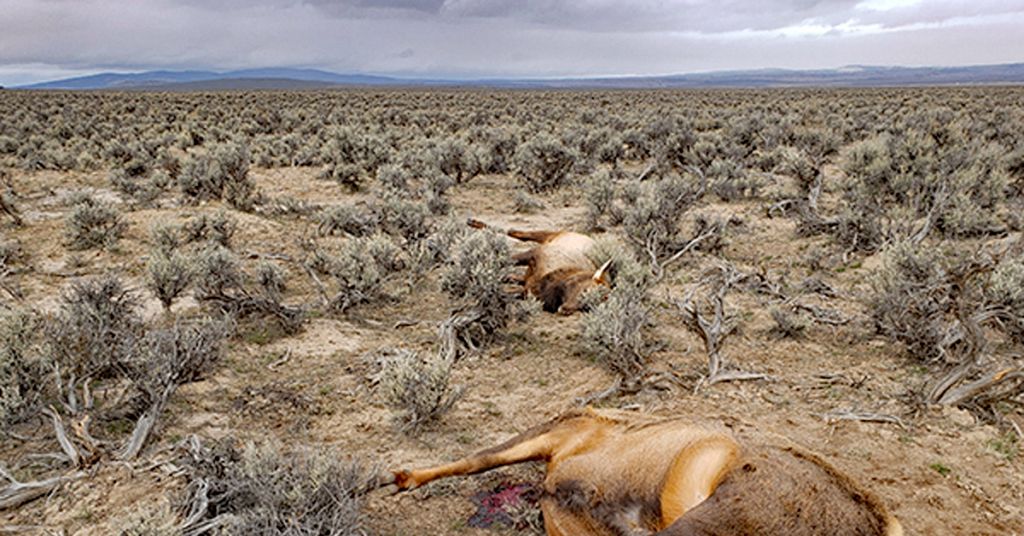
Crime scene: Two of the elk illegally killed in May in eastern Oregon. Photo: ODFW
By Bill Weiler, July 22, 2022. In late May, two Hines, Oregon, residents were sentenced for their involvement in killing a minimum of seven elk while shooting into the fleeing herd in December 2021.
“The crime left two calves, two cows and a spike bull rotting in high-country sagebrush,” according to the Oregon Department of Fish and Wildlife. “Chris Lardy and his wife, Stephanie, were convicted of multiple wildlife offenses on May 20.”
This poaching case made headlines because of the cruelty involved, but perhaps also because of the following unique aspects:
- Someone turned them in
- They were caught
- They went to court
- They were sentenced
The case also raised interest because earlier this year the Oregon Department of Fish and Wildlife made headlines by promising to crack down on poachers who engage in so-called “thrill kills.” The state’s Department of Justice hired a special anti-poaching prosecutor, Jay Hall, to make the point.
When it comes to crimes against wildlife, poaching is at the top of the list regarding public disgust. It is a cowardly act to use a high-powered gun to shoot a defenseless animal.
Many times, the animal killed is not harvested for meat. The animals usually poached are on the endangered species list or are big game animals.
A 2017 poaching case involving residents of Skamania County, Washington, occurred when investigators documented the unlawful slaughter of more than 100 animals including black bears, cougars, bobcats, deer and elk.
“This ranks at the top,” said Capt. Jeff Wickersham, who patrols southwest Washington’s District 5 for the Washington Department of Fish and Wildlife. “There’s been other violations across the state where you have a small group of people that unlawfully take and poach a number of animals. But we’ve never seen anything like this.”
WDFW ultimately arrested 20 individuals. Some of the suspects had prior unlawful hunting convictions and faced Class C felonies that carry a penalty of up to five years in jail and a $10,000 fine.
One of the 20 people arrested in the case was sentenced and pleaded guilty to second-degree illegal hunting of big game in Skamania County Court. He was sentenced to 14 days community service and a $500 fine.
The primary suspect in the Washington case was sentenced to only one year in prison; another major poacher served just 23 days in home confinement.
Something is wrong with the criminal justice system and wildlife cases.
Sentence structure
In the recent Harney County elk poaching case, the main perpetrator was required to write and publish an apology letter in the Burns Times-Herald as part of his sentence, which also included six days in jail, 18 months of bench probation and a three-year prohibition from hunting activities, including as an observer or mentor.
In addition, the pair must take hunter education courses to regain hunting rights following their three-year suspensions.
And they will pay a combined $2,500 in fines and restitution.
“The plea offer proposed went through a number of revisions,” prosecutor Jim Carpenter told Columbia Insight via email. “Initially I had asked for a substantially higher sanctions.

Poaching prosecutor: Jay Hall assisted with the conviction. Photo: Oregon DOJ
“When proposed to the Oregon State Police, per their request, I reworked my offer in consideration of their views prior to sending it to defense counsel. The court followed my recommendation with the exception of the jail time. I had not recommended jail time.”
Carpenter, the district attorney for Grant County, was designated as a special deputy district attorney for Harney County for the case. Though he was the sole prosecutor for the case, he was assisted by the DOJ’s special anti-poaching prosecutor Jay Hall.
“Mr. Hall was instrumental in assisting with this case, particularly in the area of fines being recovered by the department of wildlife, similar to restitution,” said Carpenter. “Mr. Hall also provided much of the charging language in the charging document, tailored specifically to this case.”
How does the sentence compare with previous sentences for poachers?
“The sentence is within local customary norms, with the exception of the jail time,” said Carpenter. “Jail time had not been imposed in a game case in the 24th Judicial District for as long as I can remember.”
If you’re a wildlife advocate, you might be upset with the lax penalty, yet at least penalties were handed down.
When the media displays poaching crimes on front pages, momentum can be created, and perhaps, hopefully, we are starting to see some movement toward taking wildlife poaching seriously.
For decades, wildlife crimes were stuffed to the bottom of the judicial system barrel. As Columbia Insight reported in May, at least in Oregon, with new legislation to increase fines and incentives to report wildlife crimes, we can hope poachers may be the ones in peril.
Wildlife appreciation
The results of a new national poll from the Data for Progress mimics similar polls from around the country, demonstrating overwhelming support for wildlife and habitat conservation and the bipartisan Recovering America’s Wildlife Act.
The RAWA legislation has passed the U.S. House of Representatives and is pending in the Senate.
The bill will provide substantial new funds ($1.93 billion) for state and tribal fish and wildlife conservation efforts.
In a 2021 poll of more than 1,100 likely voters, 91% said it was important to save-at-risk wildlife, fish and plants for future generations.
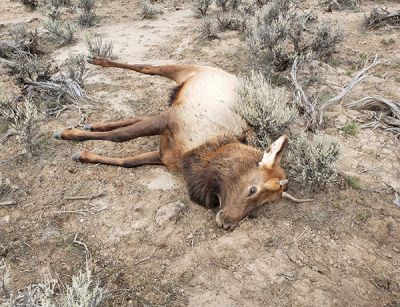
What cost? Convictions and costly sentences for poachers remain rare. Photo: ODFW
The poll also found that more than two-thirds of voters (67%) prefer local collaboration to restore habitats.
Majorities of Democrats, Republicans and independents preferred this approach.
This is progress. Consider that we are in the first wave of additional funding for more legal staff to fight poaching in Oregon, and an increasing amount of public appreciation for wildlife, as well as the potential for the largest infusion of federal wildlife management dollars in history through RAWA.
Despite these noble efforts we will still have to deal with poachers.
Additional solutions to lessen poaching involve children spending greater time outdoors, interacting with wildlife at their earliest possible ages, before they’re mesmerized by violent video games.
State wildlife agency enforcement departments need a significant increase of new staff in order to reduce their massive jurisdictional territories.
Poaching penalties must be substantially stiffer regarding monetary cost and jail time to help deter would-be poachers from carrying out their heinous activities, while increasing awards for turning in poachers should be increased.
Ultimately, judges must elevate wildlife poaching cases as a priority, handing down tough sentences that become the headlines for all to see.
Bill Weiler is a fish and wildlife biologist and environmental educator.
The views expressed in this article belong solely to its author and do not reflect the opinions of anyone else associated with Columbia Insight.
To report a case of wildlife poaching in Oregon contact the Turn In Poachers (TIP) line: 800-452-7888 or TIP@osp.oregon.gov.
RELATED: Amid spike in thrill kills, wolf poisonings, Oregon strengthens anti-poaching efforts
RELATED: Group says state wildlife agency values hunters over conservation, aims for reforms


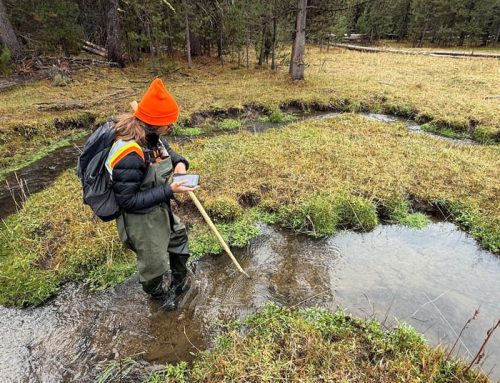
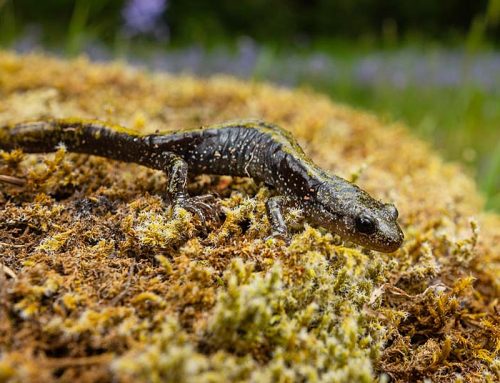


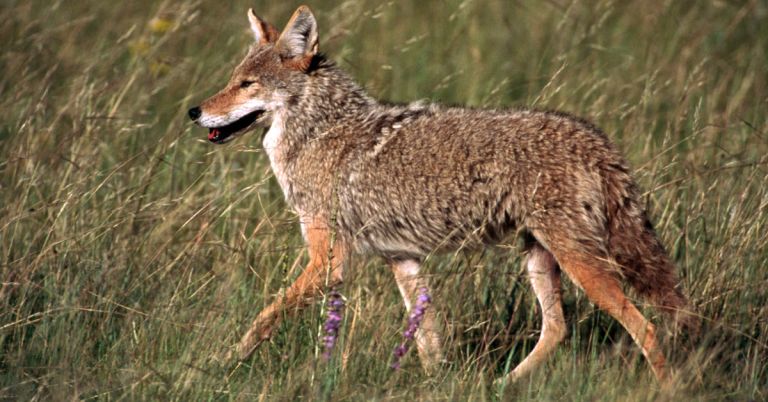

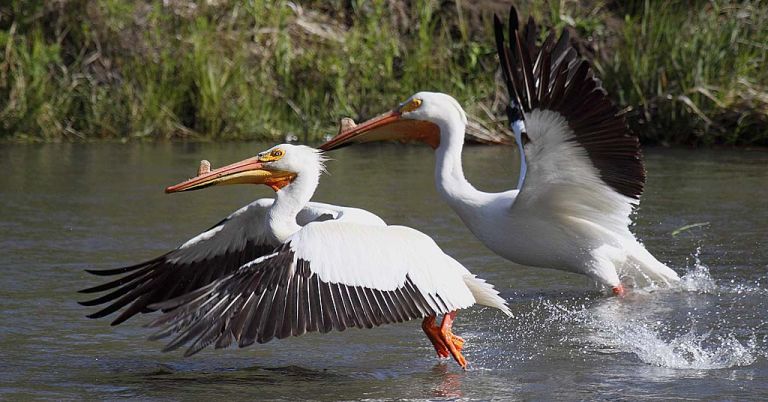



Thanks for writing about the lax enforcement and fines fo poaching. They should go to jail and have big fines. The animals can’t protect themselves and need help.
I appreciate this article & agree with Jurgen’s comment. After time served the poachers should be required to wear a tracking device for some period of time, be subject to harsh punishment if they offend again, and give up gun & hunting licenses for years.